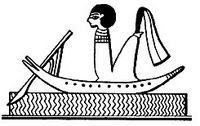James Hillman's exploration of polytheism appears in psychology student Liz's post,
"Songs to the gods of my soul". Scroll to the image of ping pong paddles for her introduction to Hillman. She writes, "A polytheistic approach to psychology, therefore, is not about hitching a transcendent wagon to the star of self-improvement, but rather it 'obliges consciousness to circulate among a field of powers,' i.e. our states of being and their soul mates (our god guides) are multiple, relational, and contingent — all the archetypal gods help us evolve as we live through our life's experiences."

Liz adds, "Salting Hillman's account of polythesim is
Thomas Moore's discussion of the Marquis de Sade’s provocative writing, which locates polytheism in a different set of archetypes, i.e. so-called sexual perversions. (A former monk and author of
Care of the Soul, a book that shook my world views to their core, Moore's chapter devoted to the gifts of depression was game changing for me. Up to that point, I believed that depression was a disease requiring nothing short of a psychological root canal. But I digress ...)"
She continues, "In his book
Dark Eros, Moore explores de Sade's account of human nature in all its manifestations, especially the dark, the horrifying, the sickening. De Sade’s overarching principle, paraphrased by Moore, states: 'If nature plants ‘sick’ fantasies in our imaginations, then perhaps nature is expressing an unfathomable and revolting truth.' This notion becomes an entry point for Moore in his role as a therapist, especially after he realized that a moralizing approach to his patients’ dark fantasies did not honour their inner world. Moore learned instead to approach that world on its own terms, opening up to the shadow as something with an important message to deliver."
Liz recounts exchanges with a friend that help her accept his and her own dark fantasies.
Labels: Dark Eros, Polytheism











